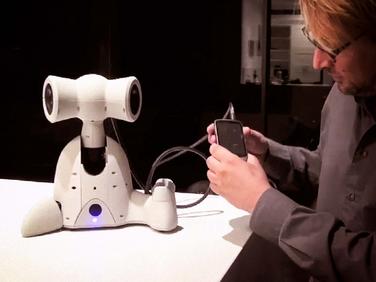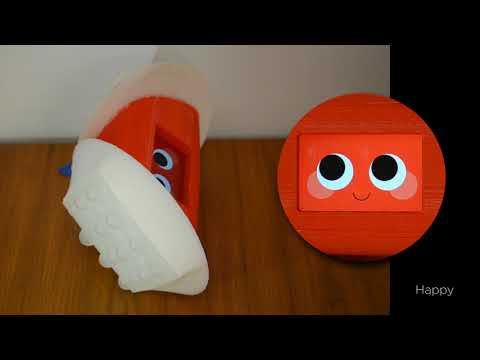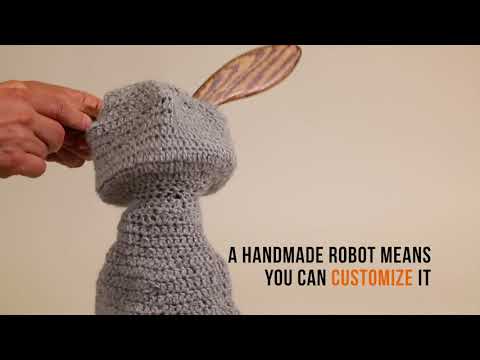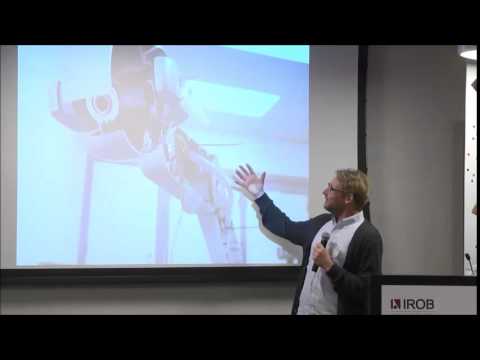Videos
Learn More About Guy Hoffman
Guy Hoffman isn’t just a world-renowned roboticist – he’s also an animator and a musician, two talents among many that enable him to invent better, friendlier robots. Hoffman is a pioneer in Artificial Intelligence and Human-Robot Interaction – the programming of robots to match human abilities. By emphasizing qualities like spontaneity, improvisation and user-friendliness in the machines he builds, Hoffman is leading the movement for enabling robots’ greater use in people’s daily lives.
Assistant Professor of Mechanical and Aerospace Engineering at Cornell University and formerly the co-director of the IDC Media Innovation Lab in Israel, Hoffman is well-known for creating “robots with soul.” Hoffman’s work explores robots’ social intelligence – particularly how they think, feel, and move – as they interact with humans. His user-centered design approach is valuable wherever machines need to be able to replicate and understand human social and emotional cues, from health care, to services and education. His work also represents a vital contribution to the future of work, which will involve the greater utilization of robots and AI in roles traditionally performed by humans. He emphasizes, however, the role of robots as partners rather than replacements for humans, and how we must develop a new approach that optimizes the abilities and talents of both machines and people.
Hoffman’s TED talk continues to be a viral sensation and has propelled him onto the global stage. Viewed more than 3 million times, it is among the top 10 most-viewed of 2014 and one of the most viewed online talks on robotics. He has designed several award-winning social robots, and he continues to develop AI that enables robots to relate to and work with humans in a more natural, intimate and productive way. As part of his research, he designed the world’s first human-robot theater performance, as well as the first real-time improvising human-robot jazz duet. In his highly engaging keynotes, Hoffman showcases how AI can be employed both collaboratively and creatively, unlocking innovative solutions with far-reaching impacts for every industry and society.
Passionate, provocative and entertaining, Hoffman has been invited to work with top consumer companies to advise on the design of domestic robotics products. His work has been published and exhibited worldwide and covered in the international press, including CNN, BBC, PBS, NBR, The New York Times and even Comedy Central. Chosen twice to be one of Israel’s most promising scientists under 40, Hoffman and his work have garnered numerous recognitions. His robotic desk lamp, “AUR,” won the 2007 IEEE International Robot Design Competition, and he was animation and software lead on the World Expo Digital Water Pavilion, which received one of TIME Magazine’s “Best Inventions of the Year” Award.
A 21st century “Renaissance Man,” Hoffman has taken an unconventional career path, studying a variety of fields, including cinema, mathematics, computer science, philosophy and psychology. He holds a doctorate from the MIT Media Lab in the field of human-robot interaction, a Master of Science in computer science from Tel Aviv University, and a Master of Fine Arts from Parsons School of Design in New York City.
Guy Hoffman is available to advise your organization via virtual and in-person consulting meetings, interactive workshops and customized keynotes through the exclusive representation of Stern Speakers & Advisors, a division of Stern Strategy Group®.
Innovating by Designing the Future
With technology shifting at an ever-rising pace, it is increasingly hard to design products and services that will stand the test of time – or even be relevant when their development cycle is over. Throughout his career, Guy Hoffman has been designing for a future that was still years away. For more than ten years, since graduating from the MIT Media Lab, he has been predicting our technological future. In 2008, he developed location-based mobile podcasts; in 2009, he developed one of the first Android Apps which climbed to the #1 spot in its category; in 2011, he built a prototype for an Augmented Reality game; and he has designed Social Robots for smart-homes and other applications ever since. In this presentation, he discusses the lessons learned and the methods and techniques used to predict the future and to design for it.
The Future of Robots in Health Care
According to Guy Hoffman, robots are being developed to serve in hospitals. They can provide medical services, such as drug delivery or taking patients’ blood pressure and temperature, and can act as nursing assistants, transporting supplies behind the scenes. With the spiraling cost of medical care and the aging of populations, a dwindling number of caregivers is guaranteed in years to come, and robots can be employed to mitigate these problems. Although robots can provide a great deal of efficiency gains and cost savings, we must ponder the impact they will ultimately have on patients. In this presentation, Hoffman explains both the potential of robots in the health care industry and the ethical and emotional considerations we must take into account when designing them for such purposes. What aspects of care are best given to robots, and where is a human touch still necessary? Focusing on the importance of user-centered design, Hoffman takes the issue beyond utility and efficiency to the heart of what patients need emotionally from their caregivers and explores whether machines are capable of providing it.
Living with Robots and AI: Will We Remain in Control?
Some of the biggest questions related to artificial intelligence and robotics are not just about technology, but about how they affect our lives, our society and our culture. Therefore, it’s time for society at large to get involved in the AI discussion, says Guy Hoffman. How much control are we willing to give up? How much decision-making should a robot or an AI algorithm be allowed to do? Hoffman delves into these questions and explains why the issue of control between man and machine is not a binary one, but a gradient between having full control and none at all. This presentation helps AI developers, organizations and consumers alike better understand this crucial question, and what framework they should employ to decide how much independence they should cede to their robotic partners.
Designing AI and Robots with Human Values
A new generation of roboticists is creating a future where robots and AI operate not just behind factory doors or on faraway planets, but with humans on a daily basis. Professor Guy Hoffman, who has been working in the field of human-robot interaction for more than 15 years, foresees the integration of AI and robotics into all aspects of our lives, from our homes to our offices, schools and hospitals. As machine learning allows robots to develop new skills, and as they become our co-workers, medical staff, companions and educators, we must consider the core values that go into designing them and their software. In this presentation, Hoffman discusses state-of-the-art robotics and AI, how it is starting to affect every industry, and his work on designing robots with human values in mind. In the near future, robots will be all around us; we should ensure they reflect the best of our humanity, not the worst.
Less than Perfect Robots: Lessons Learned from Jazz and Theater for AI Robots
Traditional robots analyze their environment, then plan and execute a response. This results in behaviors that are predictable and calculated, but also difficult to understand, inflexible – and robotic. That’s a problem Guy Hoffman is solving. As robots are poised to become a major part of our lives, engineers are already designing robotic assistants for offices, nursing homes, hospitals and classrooms – all places where they need to get close and personal with humans. Hoffman explains why we prefer robots that are less robotic and more improvisational, and what we can learn from the arts to advance AI. He also discusses how animation, acting lessons and jazz led to a new approach to AI, involving robots that “think with their bodies,” plan less, improvise more and take chances – even at the risk of making mistakes. He delves deeper into robotic body language and how it will shape the future of robotics, helping them communicate more effectively with humans and giving us a better user experience in our offices, hospitals, homes and schools.






![[SDF2014] 우리는 실수하는 로봇을 원한다? - 가이 호프만](jpg/hqdefault-782.jpg)






















